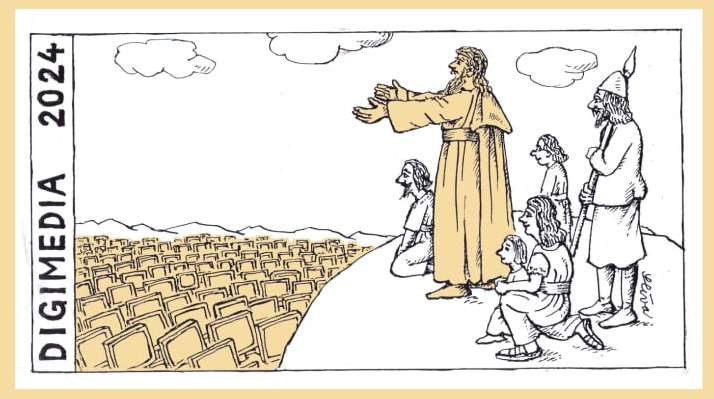The conference is organized by the Association of Czech Advertising Agencies and Marketing Communications and is held under the auspices of the Minister of Industry and Trade Jozef Sikely, who is invited to the opening ceremony.
The first session will return to last year's World Radiocommunication Conference WRC-23 and the decision held there on the fate of the UHF band, crucial for the preservation of terrestrial TV broadcasting. What will be the impact of the conclusions of this conference, which confirmed the protection of TV frequencies until at least 2031, on the Czech market? And how will they be reflected in the forthcoming update of the Radio Spectrum Utilisation Plan being prepared by the Czech Telecommunications Office? Won't terrestrials eventually beat IPTV?
We will also talk about the high inflation that has plagued not only ordinary consumers but also broadcasters for the past two years. Nevertheless, new television stations are entering the airwaves, relying on terrestrial broadcasting. How will they fare and what are their chances of success in the advertising market? And will the regional TV multiplexes be as successful as the DVB-T2 networks in attracting clients? The rapid increase in the price of advertising slots proves that the TV channels are succeeding. Will the TV market grow in the future? And will Czech Television succeed in pushing for an increase in the licence fee in Parliament and in front of commercial TV operators, with whom it is debating this issue in a working group set up by the Ministry of Culture? Will the declared charter be created to better define the scope of the public service?
How will the Czech media cope with the deployment of artificial intelligence?
Artificial intelligence in media services will be the focus of the second session of the Digimedia 2024 conference. Český rozhlas (Czech Radio) recently announced the introduction of clear rules for the use of AI by editors in content creation. Will commercial media follow suit and what internal rules does Česká Televiz (Czech Television) have in this area? To what extent will media outlets let AI process content and what is the editorial control over this content? Should all AI-generated content be clearly labelled and how? The extent to which AI can replace journalists and copywriters will also come up. Aren't we in for similar protests to those of actors in Hollywood who feared they might be replaced by AI avatars? After all, this is already partly happening with presenters: just think of the examples of Prague's Expres Radio or TV Brno 1.
So question appear, wheater the AI-powered avatars couldn´t replace radio and TV presenters? Will this mean a loss of work for human presenters? And what is the legal treatment of the use of AI avatars in the human form of real presenters? Discussants in the second session of the conference will also address the question of who will be held responsible for what an avatar based on a real presenter says or does. Not to be left behind will be the topic of AI deployment in better targeting of advertising on the internet or through hybrid HbbTV broadcasting. Digimedia 2024 will also look at how AI helps with the technical aspects of broadcasting and automation, for example with subtitling, and to what extent it is autonomous in this. And it will also pause on the ethical issue of using AI to "revive" deceased performers - what rules to set with respect to the bereaved as well?
Digital networks for radios handed out, the fight for customers begins
The third block of the Digimedia 2024 conference, traditionally focused on digital radio broadcasting, will be very popular this year. This year we have just seen the allocation of frequencies for DAB+ digital networks for commercial radio, so this time there will be no academic debate. Participants of the conference will learn how the CTU is satisfied with the result of the DAB+ frequency auction. Did it expect to auction all 29 networks and a final proceeds of almost 80 million crowns? Is it realistic to launch and fill all digital networks with radios? And won't the big commercial radios cannibalise FM broadcasting by broadcasting on DAB+? Because they will get into a schizophrenic situation where on the one hand they want to preserve FM in the long term, but they don't want to have a low reach in DAB+. Yet only 15 per cent of Czech households have a digital radio receiver. What to do about it?
Digimedia 2024 will also ask whether the Czech advertising market is ready for the multiplication of commercial radio. Last year, radios made CZK 1.5 billion, how many stations can be supported with that? Will completely new radios with new operators emerge, or will the digital space be dominated by clones of existing commercial radios? The organisers of the conference will ask the individual operators of the tendered DAB+ networks about their multiplex development plans and will also ask the representatives of the public Czech Radio, which is the only one in the Czech Republic that broadcasts digitally in DAB+ in its entirety. There will also be questions about the future of analogue broadcasting in the FM band and whether it will be switched off at some point in the future or whether there will be any joint campaign to promote DAB+ across network operators and commercial radio operators.
Source: mam.cz

